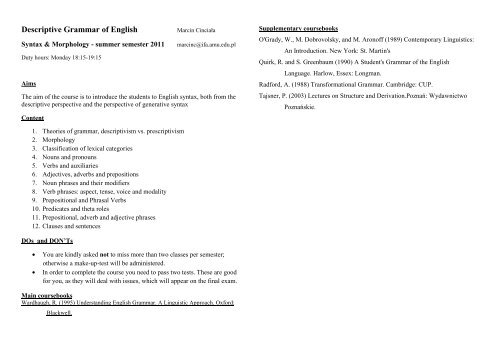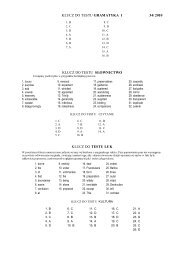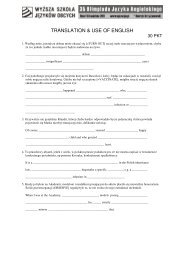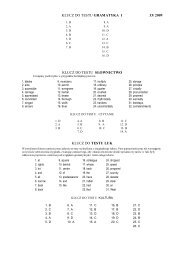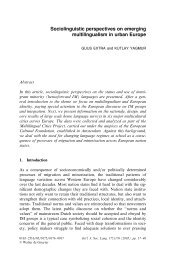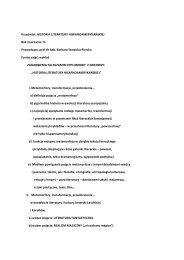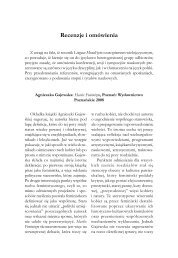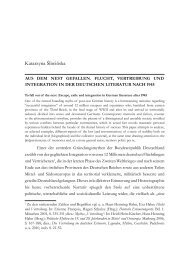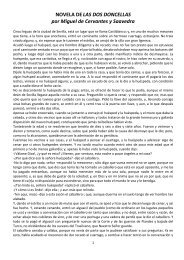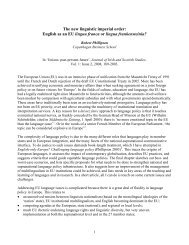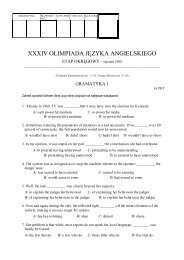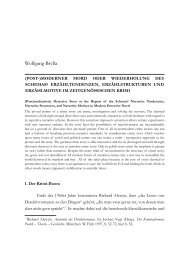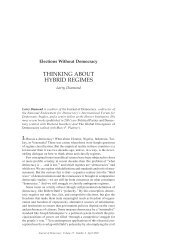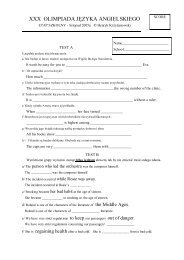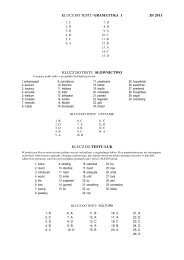2011 Descriptive Grammar of English Marcin CinciaÅa - Serwis ...
2011 Descriptive Grammar of English Marcin CinciaÅa - Serwis ...
2011 Descriptive Grammar of English Marcin CinciaÅa - Serwis ...
Create successful ePaper yourself
Turn your PDF publications into a flip-book with our unique Google optimized e-Paper software.
<strong>Descriptive</strong> <strong>Grammar</strong> <strong>of</strong> <strong>English</strong><br />
Syntax & Morphology - summer semester <strong>2011</strong><br />
Duty hours: Monday 18:15-19:15<br />
Aims<br />
<strong>Marcin</strong> Cinciała<br />
marcinc@ifa.amu.edu.pl<br />
The aim <strong>of</strong> the course is to introduce the students to <strong>English</strong> syntax, both from the<br />
descriptive perspective and the perspective <strong>of</strong> generative syntax<br />
Content<br />
Supplementary coursebooks<br />
O'Grady, W., M. Dobrovolsky, and M. Aron<strong>of</strong>f (1989) Contemporary Linguistics:<br />
An Introduction. New York: St. Martin's<br />
Quirk, R. and S. Greenbaum (1990) A Student's <strong>Grammar</strong> <strong>of</strong> the <strong>English</strong><br />
Language. Harlow, Essex: Longman.<br />
Radford, A. (1988) Transformational <strong>Grammar</strong>. Cambridge: CUP.<br />
Tajsner, P. (2003) Lectures on Structure and Derivation.Poznań: Wydawnictwo<br />
Poznańskie.<br />
1. Theories <strong>of</strong> grammar, descriptivism vs. prescriptivism<br />
2. Morphology<br />
3. Classification <strong>of</strong> lexical categories<br />
4. Nouns and pronouns<br />
5. Verbs and auxiliaries<br />
6. Adjectives, adverbs and prepositions<br />
7. Noun phrases and their modifiers<br />
8. Verb phrases: aspect, tense, voice and modality<br />
9. Prepositional and Phrasal Verbs<br />
10. Predicates and theta roles<br />
11. Prepositional, adverb and adjective phrases<br />
12. Clauses and sentences<br />
DOs and DON’Ts<br />
• You are kindly asked not to miss more than two classes per semester;<br />
otherwise a make-up-test will be administered.<br />
• In order to complete the course you need to pass two tests. These are good<br />
for you, as they will deal with issues, which will appear on the final exam.<br />
Main coursebooks<br />
Wardhaugh, R. (1995) Understanding <strong>English</strong> <strong>Grammar</strong>. A Linguistic Approach. Oxford:<br />
Blackwell.
THEORIES OF GRAMMAR<br />
I. <strong>Descriptive</strong> grammar<br />
1. Morphology<br />
2. Syntax<br />
II. Other types <strong>of</strong> grammar<br />
1. Pedagogical<br />
2. Prescriptive<br />
3. Generative<br />
III. E-linguistics vs. I-linguistics<br />
IV. Competence vs. Performance<br />
V. Grammaticality vs. Acceptability<br />
Classification into parts <strong>of</strong> speech<br />
I. Notional definitions <strong>of</strong> word classes<br />
Problems:<br />
II. Structural criteria for classification<br />
1. Formal characteristics<br />
2. Distributional properties<br />
1. The mission if USS Enterprise is to boldly go where no man has<br />
gone before<br />
2. Hopefully, the weather will clear up tomorrow.<br />
3. It’s me who gets the blame for everything.<br />
4. It was the most unique event in the history <strong>of</strong> the town.<br />
5. Finding the door unlocked, the opportunity to escape revealed itself.<br />
Issues to remember from the exercise:<br />
- Dangling infinitive,<br />
- Sentential vs. VP adverbs<br />
- (non)gradability <strong>of</strong> adjectives<br />
- Split infinitive<br />
Key words<br />
- language,<br />
- linguistics,<br />
- grammar,<br />
- prescriptive grammar,<br />
- descriptive grammar,<br />
- language faculty,<br />
- competence vs. performance.<br />
III. Typical vs. peripheral lexical items<br />
IV. Problem: Circularity<br />
Exercises:<br />
What is wrong with the following sentences according to prescriptivists.
MORPHOLOGY<br />
1. Words and morphemes<br />
(a) morphemes – the minimal meaningful units <strong>of</strong> language,<br />
(b) words – minimal free forms.<br />
2. Morphology<br />
2. What does morphology deal with<br />
3. Enumerate the major lexical categories.<br />
4. What is the difference between a bound and a free morpheme<br />
5. Exemplify and name types <strong>of</strong> affixes.<br />
6. What is the difference between derivation and inflection Name<br />
three criteria distinguishing derivational affixes from the<br />
inflectional ones.<br />
7. What are nouns morphologically marked for<br />
8. What are verbs morphologically marked for<br />
(a) simple vs complex words,<br />
(b) closed vs open classes,<br />
(c) morphemes and allomorphs,<br />
(d) free vs bound morphemes,<br />
(e) derivation through affixation: prefix – stem – suffix<br />
(f) zero derivation (conversion),<br />
(g) ablaut,<br />
(h) stress shift.<br />
3. Word formation<br />
(a) derivation and derivational rules,<br />
(b) compounding,<br />
(c) clipping, blending and backformation.<br />
4. Inflection<br />
(a) inflection vs derivation,<br />
(b) nominal inflection,<br />
(c) verbal inflection (Wardhaugh 1995: 51-60, 64).<br />
Questions:<br />
1. What does it mean that words are arbitrary
WORD CLASSES<br />
Parts <strong>of</strong> speech and their divisions.<br />
primary auxiliary<br />
concrete<br />
countable<br />
abstract<br />
common concrete<br />
VERBS<br />
auxiliary<br />
semi-auxiliary<br />
Lexical<br />
modal auxiliary<br />
uncountable/mass<br />
NOUNS abstract<br />
proper<br />
intransitive<br />
linking S V L NP/AP (pred.)<br />
intransitive (pred.) S V I (AdvP/PP)<br />
VERBS<br />
personal (subject/object)<br />
central<br />
reflexive/reciprocal<br />
possessive (attributive/absolute)<br />
transitive<br />
monotransitive S V T O DIR<br />
complex-transitive S V C O DIR O COMP<br />
PRONOUNS<br />
relative<br />
ditransitive S V G O INDIR O DIR<br />
interrogative<br />
attributive/postpositive<br />
demonstrative<br />
indefinite<br />
ADJECTIVES<br />
predicative
ADJECTIVES<br />
stative/dynamic<br />
gradable/non-gradable<br />
inherent/non-inherent<br />
1. How does distribution <strong>of</strong> words in a sentence help in their classification<br />
into the parts <strong>of</strong> speech categories<br />
2. There are two expletive subjects in <strong>English</strong>: what are they and how do<br />
they differ<br />
3. Give examples <strong>of</strong> parts <strong>of</strong> speech which have suppletive forms.<br />
4. What does it mean that an adjective is non-gradable<br />
pure adv.<br />
ADVERBS compound adv.<br />
derived adv.<br />
copulative<br />
5. How do nouns and pronouns differ in terms <strong>of</strong> their morphological<br />
marking (open/closed class, Case marking, person distinction, gender<br />
contrast, number forms morphologically related/unrelated).<br />
6. What is the difference between Saxon and Periphrastic Genitive Refer<br />
to their form, meaning and use.<br />
coordinating disjunctive<br />
adversative<br />
CONJUNCTIONS<br />
Subordinating<br />
Morphological marking (inflection) <strong>of</strong> different parts <strong>of</strong> speech<br />
Case, number and gender <strong>of</strong> nouns and pronouns,<br />
(a) Saxon vs. periphrastic Genitive (form, meaning and use),<br />
(b) tense, aspect, mood and voice <strong>of</strong> verbs,<br />
(c) subject/verb agreement,<br />
(d) grading <strong>of</strong> adjectives and adverbs,<br />
(e) suppletive forms,<br />
(f) verb forms: infinitive, tensed and participial.<br />
Exercises:
PHRASES<br />
Constituents and constituency<br />
1. What is a constituent<br />
2. Tests for constituency:<br />
• Pronominalisation<br />
• Do-so test<br />
• Elypsis<br />
• Passive<br />
• Topicalization<br />
• Questions<br />
• Pseudo-cleft formation<br />
• Cleft test<br />
• Adverb Placement<br />
• Sentence fragment test<br />
Phrase Structure<br />
1. Head/pre-head/post/head<br />
2. Endocentricity<br />
3. Complements vs. adjuncts<br />
Noun Phrases<br />
1. Modifiers within NPs<br />
• Determiners<br />
• Pre-/post-determiners<br />
• Adjectives and their order<br />
• Nouns<br />
• Adverbs<br />
• PPs<br />
• Relative/appositive clauses<br />
2. The relation between meaning and position<br />
A man accused <strong>of</strong> the crime vs. *an accused <strong>of</strong> the crime man<br />
Someone intelligent vs. an intelligent person<br />
Verb Phrases<br />
EXERCISES<br />
1. Grammatical systems within the VP<br />
• Tense<br />
• Aspect<br />
• Voice<br />
• Modality, types <strong>of</strong> modality<br />
• Polarity<br />
2. The Structure <strong>of</strong> VPs<br />
• Complements and Adjuncts<br />
1. Draw Phrase markers <strong>of</strong> the following phrases:<br />
• Your reply to my letter<br />
• A student <strong>of</strong> <strong>English</strong> with long hair<br />
• A French <strong>English</strong> teacher<br />
• The fight after the match<br />
• Her dislike <strong>of</strong> men with big egos<br />
• The house in the wood near the park<br />
• Wrote the letter in the morning<br />
• Hit the man with an umbrella<br />
2. Label the functional projections<br />
• The fence may have been being painted<br />
• He may have been painting the fence
• She may still have been being operated on<br />
EXERCISES<br />
Draw phase markers <strong>of</strong> the following phrases<br />
Prepositional Phrases<br />
1. The function <strong>of</strong> prepositions<br />
2. The semantics <strong>of</strong> prepositions<br />
• Purpose<br />
• Direction<br />
• Time<br />
• Stimulus<br />
• Possession<br />
• Accompaniment<br />
3. The syntactic function <strong>of</strong> prepositions, oblique case.<br />
4. The structure <strong>of</strong> PPs<br />
5. Prepositions and particles, the difference between prepositional and<br />
phrasal verbs Tests:<br />
• movement<br />
• question formation<br />
• relative formation<br />
• adverb placement<br />
6. Phrasal-prepositional verbs<br />
• Very fond <strong>of</strong> Mary in some ways<br />
• Extremely keen on fishing<br />
Test whether the following constructions are phrasal or prepositional<br />
verbs<br />
• Blow up<br />
• Bring up<br />
• Come across<br />
• Call up<br />
• Call on<br />
Adjectival and adverbial phrases<br />
1. The structure<br />
2. Complements and adjuncts<br />
3. Intensifiers<br />
4. Types <strong>of</strong> adverbial phrases
BASIC CLAUSES<br />
Clauses:<br />
Sentence<br />
Simple Sentence<br />
Compound sentence Complex sentence<br />
Compound-complex sentence<br />
Predicates and thematic roles:<br />
1. Types <strong>of</strong> theta-roles:<br />
• Agent<br />
• Patient<br />
• Experiencer<br />
• Instrument<br />
• Theme<br />
• Goal<br />
• Source<br />
• Location<br />
• Benefactive<br />
• Temporal<br />
2. Unaccusative and ergative verbs<br />
EXERCISES<br />
1. Verb Complementation<br />
2. Passive<br />
1. Label the thematic roles in the constructions below<br />
Bob ate the cake with this fingers<br />
Jenny likes vodka drinks<br />
Sally grows roses<br />
The car struck the wall<br />
2. Identify the type <strong>of</strong> verb and the categories that follow<br />
Mary made me happy<br />
Marry made me some soup<br />
She appears every night<br />
She appears angry<br />
We consider the idea the solution to all our problems<br />
Subjects<br />
Complements<br />
1. Location<br />
2. Definitions<br />
3. Subject-verb agreement<br />
4. What can function as a subject<br />
5. Expletives
COORDINATION AND EMBEDDING<br />
Coordinate constructions<br />
3. Extraposition<br />
4. Topicalisation<br />
1. Coordinating and correlating conjunctions, conjunctive adverbs<br />
2. Types <strong>of</strong> constituents that can be coordinated<br />
3. Coordinate Construction Constraint<br />
4. Irreversible binominals<br />
Types <strong>of</strong> embedded clauses<br />
1. Nominal clauses<br />
• Subject noun clauses<br />
• Object noun clauses<br />
• Subject Complement NCl<br />
• Object Complement NCl<br />
• Declarative vs. Interrogative<br />
• Imperative clauses<br />
EXERCISES<br />
1. Identify and describe the embedded clauses<br />
• The exam was more difficult than expected<br />
• It’s easy to say that someone else will do it<br />
• What happened, I do not know<br />
• I hate the idea that we should work together<br />
• The fact that he succeeded is surprising<br />
2. Label the sentences as compound, complex, compound complex<br />
• I came, I saw, I conquered<br />
• I’ll do it when I’m ready<br />
• What you see is what you get<br />
2. Relative clauses<br />
• Restrictive<br />
• Non-restrictive<br />
• Appositive clauses<br />
3. Adverb clauses<br />
Transformations<br />
1. Clefting<br />
2. Pseudo-Cleft formation


